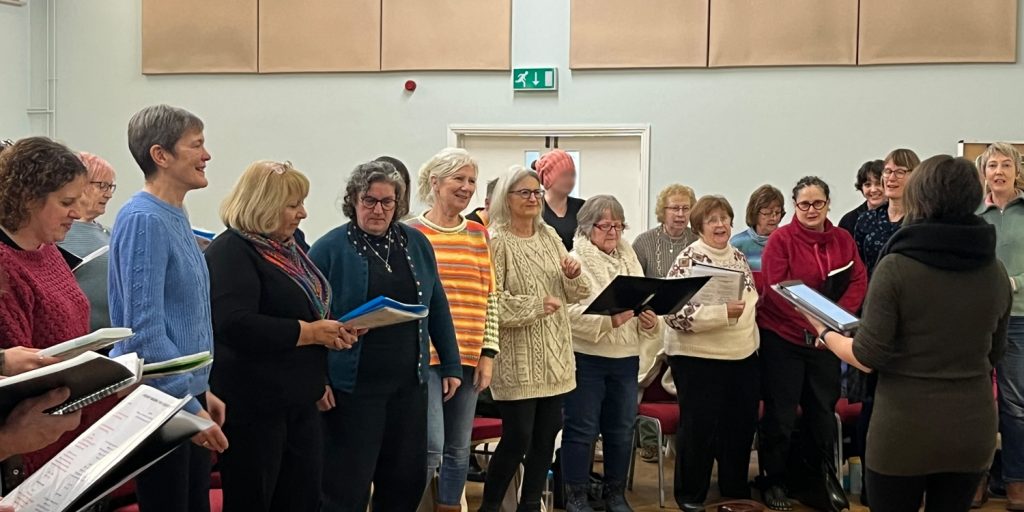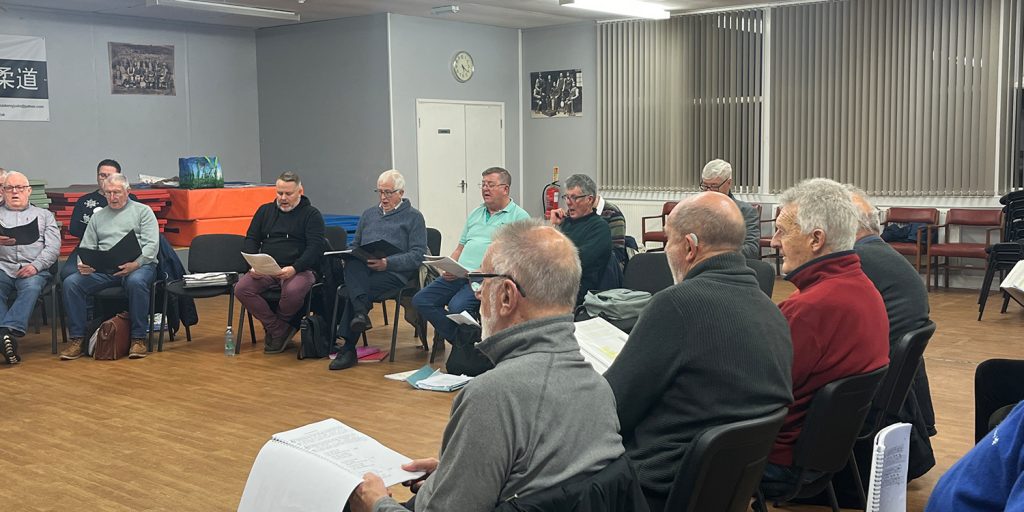While young people increasingly seek connection online, the Choirs For Good’s Wellbeing Award this November suggests the answer to combating loneliness could lie in Welsh history books

The harmonising ‘lahhhs’ of the Christmas classic Rocking Around the Christmas Tree seep from the half-ajar windows of an artificially lit church hall in Bridgend. Stepping inside you’re greeted with big smiles, tea and biscuits, and a question: “What section will you be singing for then?”
Like many other choirs across Wales, The Choir for Good is rehearsing for their upcoming Christmas concerts. While Christmas may be a busy time for these communities, it is a lonely time for a lot of individuals.
17% of people feel lonelier at Christmas, according to a survey by data and business intelligence platform Statista. While loneliness is often associated with the elderly, a Welsh wellbeing report found young people to be the loneliest generation in Wales. A huge 70% of Brits aged 16-24 say they experience loneliness, according to a research from the Centre of Social Justice this October.
The warmth of community among the singers in Bridgend’s choir begs an important question: could Welsh choirs help to combat gen Z’s loneliness?
Choirs are seen as synonymous with Welsh culture, but there’s more to the “Land of Song” than just the singing.
Historian Gareth Williams explains, from their outset in the 19th century, the male choir gave men a “sense of belonging, community and identity”. These choirs provided a third space for single young men to spend time with each other amid a backdrop of gruelling industrial work.
The average age of choristers has steadily increased since the 19th century, but the well-being benefits of community-based choirs have remained.
The University of Leicester found workplace choir singing to create an 86% reduction in feelings of loneliness and a 96% reduction in stress.
Choirs for Good won best wellbeing service in Wales this November and one of their choir managers, Ruth Haugen, feels her ensembles have “definitely” helped people with loneliness.
Collapse of community
In the 19th century, choirs provided a third space for young men in south Wales to socialise, but nowadays young people are increasingly turning to social media.
People aged between 18 and 24 are spending an average of six hours online this November, up from last year’s four hours and 36 minutes, says a study published by media regulator Ofcom this November.
Poppy Shingler is 18 years old, making her one of the youngest members of Bridgend’s Choir for Good.
She says: “I think a lot of people just spend their free time on social media, video games things like that.
Choirs are good to get you out of the house, otherwise I might have spent my gap year just scrolling,” she adds.

Another young choir member, Carrie Taylor agreed, explaining social media takes up a lot of her peers’ free time.
Adolescents who spend more than three hours daily on social media have heightened risks of loneliness, depression, and suicide, research by JAMA Psychiatry has revealed.
It is perhaps unsurprising then that research body Onward found gen Z to be experiencing a “collapse of community”: young people are half as likely to speak to their neighbours as they were in 1998, and one in five 18-34-year-olds say they have “one or fewer close friends”.
A big family
By contrast, from the men’s choir in Port Talbot, to Allegra, an all-ladies choir in Newport, to a Cardiff-based homeless choir called The Choir with No Name, the one word which kept cropping up was “family”.
Angela Hiscocks, chairperson of Allegra, says: “It’s not just being at choir, it’s the support a group of people gives you when you’re feeling lonely.”
She recalled how the choir helped her when she was going through a divorce after 32 years of marriage.
“It really helped me focus my mind on things other than, I’m on my own now,” she adds.
Mike Thomas, choir director of Pelenna Valley Choir, echoed this experience. He said the camaraderie and discipline in a male voice choir is a strong draw for ex-military men who might struggle to adjust to a more solitary life.



Did you know that singing:
- Improves the immune system.
- Can help to alleviate chronic pain for up to 6 months.
- Activates the vagal nerve, part of the parasympathetic nervous system, which. enables our body to relax faster after experiencing stress.
- Improves lung function, and can help people with asthma.
- Releases “feel good hormones” such as endorphins, dopamine and serotonin.
Choirs are posh
Choirs then seem to be the perfect opportunity for younger generations to reconnect with their community. Yet there’s worry the lack of investment in the arts has deterred young people.
Director of Only Men Aloud, Rhys Evans told the BBC in 2011, underfunding of choirs has made music elitist; students only pursue it if their parents can pay privately for tuition.
“Young people think choirs are posh. How on earth did that happen, when for two centuries they were the music of the working man?” says Evans.
The situation has only got worse since. This summer, it was revealed by performing arts union Equity that in real-terms, arts funding has decreased by 30% in Wales since 2017. This is compared to a drop of 11% in England, 16% in Northern Ireland and an increase of 2% in Scotland.
Allegra’s chairperson agrees with Evans: “There has to be a push for the arts.
There’s five of us that sang together in school from ages 11 to 17, years later we’re singing in this choir together.”
Just go
Chatting before rehearsal, Taylor and Shingler noted their peers had prejudices about choirs.
Shingler explains: “A lot of young people think it’s going to be intimidating; you think of your typical choir boys in church, but it’s very chill.”
Choirs are good to get you out of the house, otherwise I might have spent my gap year just scrolling
Taylor agreed, observing some of her peers are reluctant to join a choir because it might be “uncool” or because they’re worried they can’t sing.
But reflecting on the happiness the choir has given her, she urged other young people to: “Just go, the first time is the worst for nervousness.”
Her initial nerves soon melted away as she was immediately welcomed by a member saying: “Congratulations you’ve just gained 40 aunties and uncles.”
Perhaps then, the solution to gen Z’s loneliness epidemic could simply be taking a step into that church hall in Bridgend, having a cup of tea, and sitting yourself down in the altos’ section.
